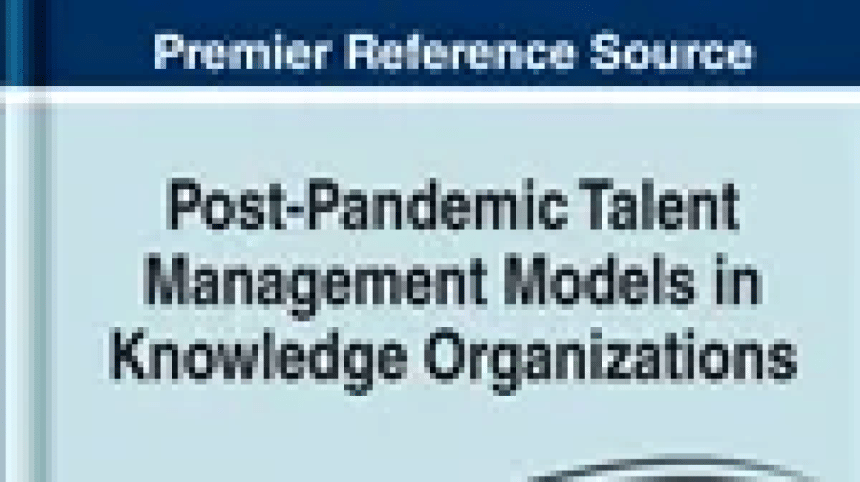Talent Management in the Post Pandemic World

The current round of reviews of the book Post-Pandemic Talent Management Models in Knowledge Organizations (IGI Global, 2022) has given pleasure to the reviewer, as the book is a noteworthy piece of knowledge, gaining the serious attention of business, management, governance, and social sciences schools around the world. The Covid-19 pandemic is arguably the most discussed and written about issue in the 21st century. The cost of this pandemic is devastating; no one and no organisation now are concerned about pandemic-related adjustments, everyone is focusing on pandemic recovery. Nevertheless, the pandemic has led organisations toward structural change and put forward transformational requirements.
Such organisational change and transformations are based on structural contingency (Thompson, 1967; Lawrence and Lorsch, 1967; Mintzberg, 1979, 1989) and population ecology (Hannan and Freeman, 1997) theories. The structural contingency theory tells us that "the best way to organize is contingent on the environment (Galbraith, 1973)." Organisations modify their internal structures to better fit and be relevant in the given environment; they are open systems focused, and their decision-makers are typically rational and efficiency-oriented (Talukdar, 2020). Corporations and ecosystems seem to be closely related, according to the lens of population ecology theory. In the end, the change process is controlled by the environment, while the environments are dynamic and unpredictable. But the organisations are characterised by their relative structural change inertia (Talukdar, 2020). The rates at which new organisations and new organisational forms emerge, change, and organisational prototypes disappear are all influenced by environmental change and changing social situations.
Keeping the above theoretical lens in mind, such changes and transformations in postmodern organizations, particularly those in the post-pandemic world, place a premium on talent management. Thus, a panel of distinguished scholars from a renowned business school—the Faculty of Business Administration at American International University-Bangladesh (AIUB), Bangladesh—Mohammad Rafiqul Islam Talukdar, Carmen Z. Lamagna, Charles Carillo Villanueva , Rezbin Nahar, and Farheen Hassan compiled and edited this advanced monograph.
It contains ten chapters, along with an introduction and a conclusion. It discusses important topics in strategic human resource management, such as the strategic aspects of human resource management, the foundation and applications of the human capital theory, and concepts and models of talent management in post-modern knowledge-based organisations during the Covid-19 pandemic and post-pandemic paradigm. It sets the goal of the highest priority for organisational development: leveraging talent management and impact-based leadership with greater agility, digitisation, branding, and future direction.
The book recognises that human capital is the main determinant of organisational performance in modern business and knowledge-based institutional sectors. The effective acquisition and management of talented employees provides companies with a superior competitive advantage and is essential for the growth and development of organisations and their brand values. It also explores and analyses the implications of talent management models on knowledge organisations in the post-pandemic paradigm. However, this raises further critical concerns that must be brought forward for the next round of talent management research.
Notable is the fact that the book ranked exceptionally high in terms of pragmatic aspects of content and the level of diversity of authors, including gender, affiliations, and geographic locations worldwide. And this trendy academic work is relevant for corporate leaders, business owners, entrepreneurs, strategic apex of organisations, advanced managers, academicians, researchers, scholars, policymakers, instructors, and graduate students around the world. The main academic areas highlighted in this publication include agile and impact-focused leadership; sustained competitive advantage; creative work behaviour; human capital theory; human capital development; strategic human resource management; knowledge-based organisations; organisational performance; talent management; virtual intelligence; organisational digitalization; and cyber security of organisations.
The book, Post-Pandemic Talent Management Models in Knowledge Organizations, can be purchased from the publisher's website: https://www.igi-global.com/book/handbook-research-post-pandemic-talent/286753.
Dr Hasanul A. Hasan is the Founder Member and former Chairman, Board of Trustees, American International University-Bangladesh (AIUB).

 For all latest news, follow The Daily Star's Google News channel.
For all latest news, follow The Daily Star's Google News channel. 








Comments